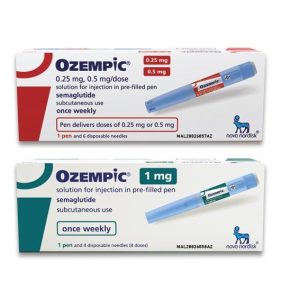With the increasing popularity of Ozempic in Australia, it’s natural for individuals who are prescribed this medication to have concerns about its potential impact on a saliva drug test result. Saliva (or more accurately oral fluid) drug tests are commonly used in workplaces across Australia to screen for drugs. In this blog post, we will explore whether Ozempic is likely to show up on a saliva drug test and what you need to know to address any concerns you may have.
Understanding Ozempic
Ozempic is a prescription medication which was approved for use in Australia on December 15, 2017. It is registered by the Therapeutic Goods Administration (TGA) as a treatment for type 2 diabetes.
The active ingredient in Ozempic is semaglutide, which belongs to a class of medications called glucagon-like peptide-1 (GLP-1) receptor agonists. It works by helping the body release insulin when blood sugar levels are high and slowing down the rate at which the liver produces glucose. This results in improved blood sugar control for people with type 2 diabetes.
Ozempic and Drug Tests
Ozempic is not known to cause “false-positive” results when oral fluid drug testing substances in standard drug screenings. Most oral fluid drug testing typically focus on detecting specific drugs classes as specified in the Australian / New Zealand Standard AS/NZS 4760:2019 such as amphetamines, methamphetamines, cocaine, opiates, oxycodone and THC (cannabis). In some workplaces it is also common to test for benzodiazepines.
Semaglutide, which is the active ingredient in Ozempic, is not chemically related to these drug classes and is therefore unlikely to interfere with onsite drug testing results.
It’s important to remember that onsite saliva drug tests are designed to identify substances that are commonly abused or specified in the Australian Standard. Medications like Ozempic, which are prescribed for legitimate medical reasons, are not part of the typical drug testing panels.
Communication with Your Healthcare Professional
If you are concerned about the potential impact of Ozempic on your drug test, the best course of action is to discuss this issue openly with your healthcare professional. They can offer personalised advice based on your specific situation and provide any necessary documentation to support your legitimate use of the medication.
In some cases, individuals who undergo drug testing and are prescribed Ozempic or other GLP-1 receptor agonists may choose to inform the drug testing provider of their medication use beforehand. This proactive approach can help avoid confusion and ensure that any not-negative result is appropriately handled.
Specialised Testing Considerations
While Ozempic is not expected to interfere with standard oral fluid drug tests, some specialised drug tests may include additional screenings substances that are not typically part of standard panels. If you know you will be subject to such specialised testing, inform the testing facility about your prescription medication usage beforehand. This allows the drug testing technician to take appropriate steps to ensure accurate and appropriate interpretation of the results.
Conclusion
Ozempic, a GLP-1 receptor agonist used to treat type 2 diabetes, is not expected to show up on standard oral fluid drug tests. As with any prescription medication, it is crucial to communicate openly with your healthcare provider and, if necessary, with the drug testing provider to ensure that your legitimate use of Ozempic is appropriately documented before testing. If you have specific concerns or questions about drug testing and your medication, consulting your healthcare provider will provide you with the most accurate and personalised information. Remember, your health and well-being should always be the primary focus when it comes to medication.
Please note: The content presented in this post may be of a general nature and is meant for informational purposes only. It may not address your specific situation, drug testing requirements, individual or workplace needs. For personalised medical advice, always consult your Healthcare Professional. This information may become outdated.






